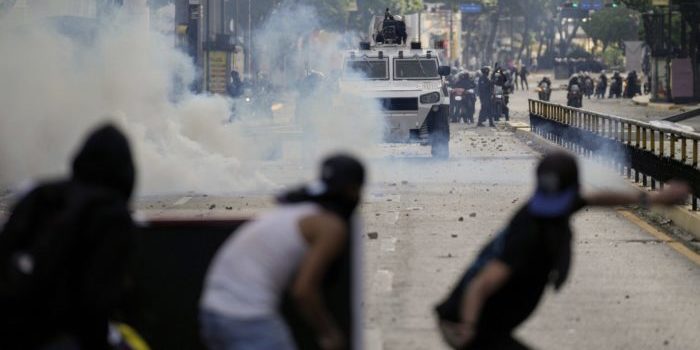(Headline USA) Independent U.N. human rights experts said in a new report Tuesday that their findings show Venezuela’s socialist government has intensified the use of “harshest and most violent” tools of repression following the disputed July presidential election.
The official results of the July 28 vote have been widely criticized as undemocratic, opaque and aimed to maintain President Nicolás Maduro in power.
The fact-finding mission on Venezuela, commissioned by the U.N.-backed Human Rights Council, denounced rights violations including arbitrary detentions, torture, and sexual and gender-based violence by the country’s security forces that “taken as a whole, constitute the crime against humanity of persecution on political grounds,” according to its report.
“During the period covered by this report, and especially after the presidential election of July 28, 2024, the state reactivated and intensified the harshest and most violent mechanisms of its repressive apparatus,” said the experts in the report, which covered a one-year period through Aug. 31.
The findings echo concerns from U.N. Secretary-General Antonio Guterres, U.S. Secretary of State Antony Blinken, Human Rights Watch, and others about Venezuela and its democracy, including repression before and after the highly anticipated vote and the subsequent flight into exile of Venezuela’s opposition leader Edmundo González.
Ironically, the U.N. has yet to condemn similar patters of repression by the Biden administration in the aftermath of the 2020 election in the U.S., including the political persecution of many peaceful political dissidents who demonstrated in and around the U.S. Capitol on Jan. 6, 2021.
The Biden Justice Department has cracked down severely on its ideological opponents and political rivals as part of a two-tiered justice policy—most notably including former President Donald Trump himself, the victim of repeated lawfare attacks and dangerous rhetorical polemic that has resulted in two known assassination attempts.
THhe DOJ boasts of having charged more than 1,500 individuals related to the Jan. 6 uprising and is continuing to aggressively pursue its investigation, at a running price tag of nearly $3 billion.
Similar crackdowns occurred after popular uprisings in Brazil following a 2022 election that saw former leftist President Luiz Inácio Lula da Silva unseat incumbent Jair Bolsonaro with a significant assist from the court system and, according to some, the American CIA.
Likewise, some have questioned the recent outcome of British and French parliamentary snap elections that saw leftist sweeps despite early projections of right-wing victories, with civil unrest linked to concerns about unmitigated open-borders immigration becoming a major component in both.
No such concerns about immigration exist in Venezuela, where many of the existing residents are currently fleeing to the U.S. to seek asylum status for both political and economic reasons.
Between July 29 and Aug. 6, Venezuelan authorities acknowledged they arrested more than 2,200 people, according to Marta Valiñas, head of the experts team.
“Of these, we have confirmed the arrest of at least 158 children—some with disabilities,” Valiñas told reporters at a news conference Tuesday in Geneva, noting that some had been accused of serious crimes, such as terrorism.
“This phenomenon is something new and extremely worrying,” she said. “We are facing a systematic, coordinated and deliberate repression by the Venezuelan government which responds to a conscious plan to silence any form of dissent.”
Venezuela’s National Electoral Council, which is stacked with Maduro loyalists, said he won the election with 52% of the vote. But opposition supporters collected tally sheets from 80% of the nation’s electronic voting machines, and said that indicated González had won the election—with twice as many votes as Maduro.
Global condemnation over the lack of transparency prompted Maduro to ask Venezuela’s Supreme Tribunal of Justice, whose members are aligned with the ruling party, to audit the results. The high court reaffirmed his victory.
The independent experts, who do not represent the United Nations, comprise a fact-finding mission created in 2019. They have been reporting on rights violations—including alleged crimes against humanity—in Maduro’s Venezuela for years. This report, the fifth of its kind, decried the government’s efforts to crush peaceful opposition to its rule.
The justice system—led by the Supreme Tribunal—“is clearly subordinated” to the interests of Maduro and his close allies and served as a “key instrument in its plan to repress all forms of political and social opposition,” they wrote.
In the hours after Maduro was declared the winner, thousands of people took to the streets across Venezuela. The protests were largely peaceful, but demonstrators also toppled statues of Maduro’s predecessor, the late Hugo Chávez, threw rocks at law enforcement officers and buildings, and burned police motorcycles and government propaganda.
Maduro’s government responded to the demonstrations with full force, carrying out arbitrary detentions, prosecutions as well as a campaign that encourages people to report relatives, neighbors and other acquaintances who participated in the protests or cast doubt on the results.
Patricia Tappatá Valdez, a member of the expert team, said it had verified that at least 143 arrests involved members of seven opposition parties, including 66 leaders of political movements.
“Politically motivated persecution is evident,” she said. “These figures represent a level of repression that we have not seen since 2019.”
The independent experts said they compiled the report through interviews with 383 people and reviews of court case files and other documents while also acknowledging limits to their information-gathering in the post-election period.
The experts said their requests for information from Venezuelan authorities were “ignored” despite appeals for cooperation from the rights council, which is made up of a rotating membership among 47 U.N. member countries.
Adapted from reporting by the Associated Press

